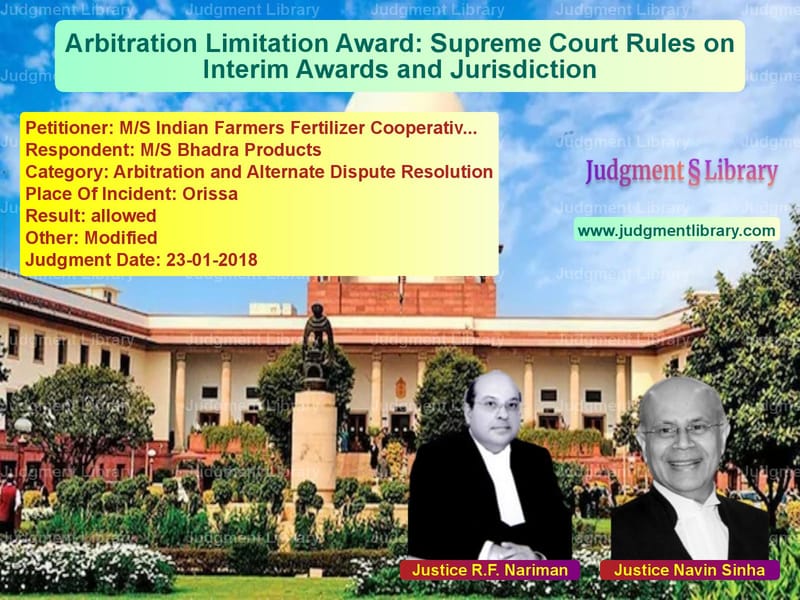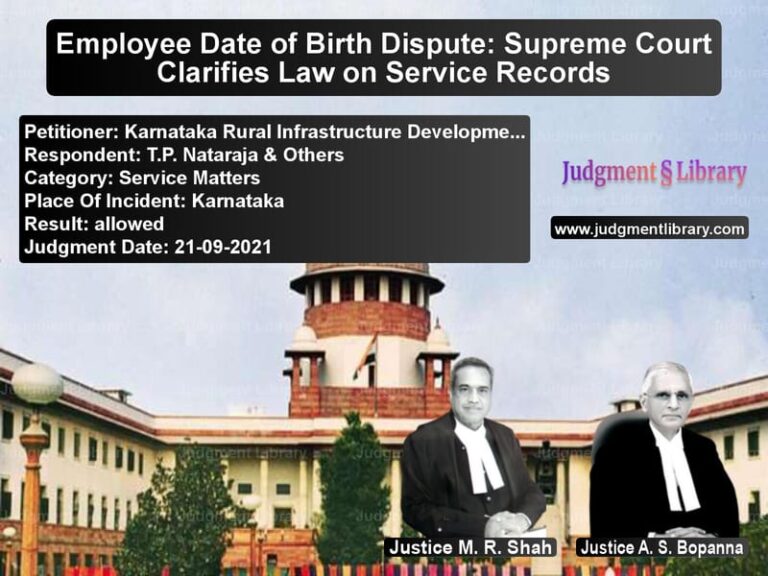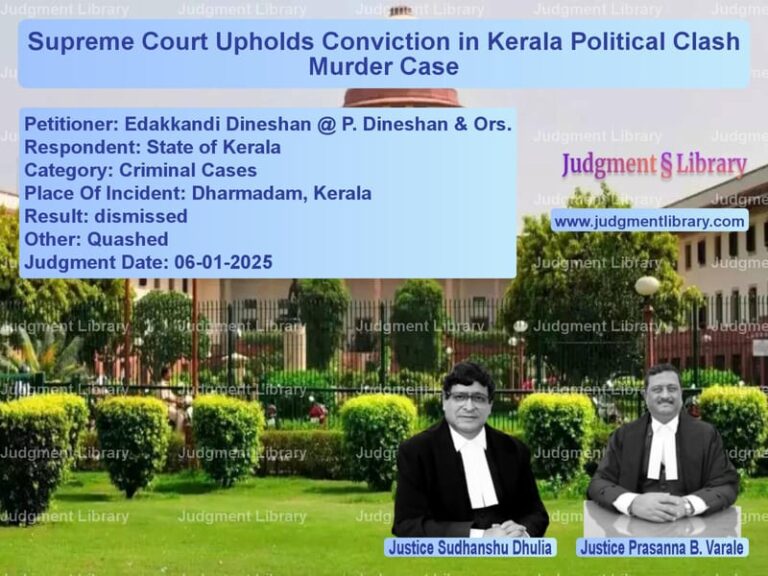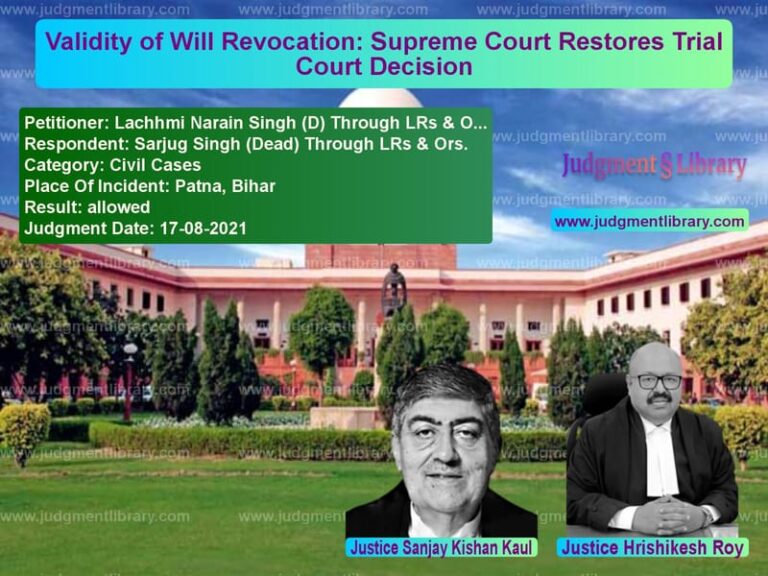Arbitration Limitation Award: Supreme Court Rules on Interim Awards and Jurisdiction
The Supreme Court of India, in its judgment on January 23, 2018, ruled on whether an arbitration award deciding the issue of limitation constitutes an interim award under the Arbitration and Conciliation Act, 1996. The case, M/S Indian Farmers Fertilizer Cooperative Limited v. M/S Bhadra Products, addressed whether such an award could be challenged under Section 34 of the Act. The Court held that an award on limitation is an interim award and can be separately challenged.
Background of the Case
The dispute originated when the appellant, Indian Farmers Fertilizer Cooperative Limited, issued a tender inquiry for the supply of Defoamers. The respondent, Bhadra Products, won the tender and supplied 800 Metric Tonnes of Defoamers. However, the targeted production was not achieved within the supply period, leading to a dispute regarding payment.
On June 6, 2011, the respondent issued a legal notice demanding Rs. 6,35,74,245. The appellant disputed this claim, stating that no amount was due. The respondent invoked arbitration on October 1, 2014, and Justice Deepak Verma, a retired Supreme Court judge, was appointed as the sole arbitrator.
During arbitration, the issue of limitation was raised. On July 23, 2015, the arbitrator ruled in favor of the respondent, stating that the claims were not time-barred. The appellant challenged this ruling under Section 34, arguing that the limitation award should be set aside. However, both the District Judge and the Orissa High Court dismissed the challenge, holding that the ruling on limitation was not an interim award.
Arguments by the Appellant (Indian Farmers Fertilizer Cooperative Limited)
The appellant contended that:
- The arbitrator’s decision on limitation constituted an interim award under Section 2(1)(c) of the Arbitration and Conciliation Act, 1996.
- Since limitation affects the maintainability of a claim, it should be subject to immediate judicial review under Section 34.
- Failure to recognize the limitation ruling as an interim award would deny the right to challenge a fundamental jurisdictional issue.
Arguments by the Respondent (Bhadra Products)
The respondent countered that:
- The ruling on limitation was merely an order under Section 16 of the Act, which deals with the arbitral tribunal’s jurisdiction.
- Under Section 16(5), if the tribunal rejects an objection to its jurisdiction, the arbitration must continue, and any challenge can only be raised after the final award.
- The challenge under Section 34 was premature and should have waited until the final award.
Observations of the Supreme Court
The Supreme Court examined the relevant provisions of the Arbitration and Conciliation Act, particularly Sections 2(1)(c), 16, 31(6), and 34. The Court made the following key observations:
- “The definition of ‘arbitral award’ in Section 2(1)(c) includes an interim award, which means that an issue decided separately during arbitration qualifies as an interim award if it finally resolves a point of dispute.”
- “Section 31(6) allows an arbitrator to issue an interim award on any matter that may be decided in the final award, reinforcing the principle that such determinations can be challenged immediately.”
- “A decision on limitation is conclusive as it determines whether the claim can proceed. If the claim is found time-barred, arbitration would end. Therefore, the decision must be treated as an interim award and be open to challenge.”
- “Unlike a jurisdictional ruling under Section 16, which involves questions about the existence of an arbitration agreement, a limitation ruling is an adjudication on a substantive defense. It does not fall within the scope of Section 16.”
- “The avoidance of piecemeal litigation is important, but in cases where an interim award conclusively determines an issue, the party must be allowed to challenge it immediately under Section 34.”
The Court also referred to English arbitration law and previous Indian precedents, such as National Thermal Power Corporation Ltd. v. Siemens Atkeingesellschaft (2007) and McDermott International Inc. v. Burn Standard Co. Ltd. (2006), which supported the view that an interim award finally deciding an issue can be challenged independently.
Final Verdict
The Supreme Court ruled that:
- The arbitrator’s decision on limitation constituted an interim award under Section 2(1)(c) and could be challenged under Section 34.
- The High Court and the District Judge erred in holding that the ruling on limitation was not an interim award.
- The appeal was allowed, and the Section 34 proceedings were reinstated before the District Judge for adjudication on merits.
- Parliament should consider amending the Arbitration and Conciliation Act to consolidate all interim award challenges under a single Section 34 petition to prevent delays.
Conclusion
This ruling clarifies the distinction between jurisdictional rulings under Section 16 and substantive determinations under Section 31(6). The Supreme Court’s decision ensures that limitation rulings in arbitration proceedings can be independently challenged, preventing unnecessary continuation of time-barred claims. This judgment strengthens procedural clarity in arbitration law and promotes efficiency in dispute resolution.
Don’t miss out on the full details! Download the complete judgment in PDF format below and gain valuable insights instantly!
Download Judgment: MS Indian Farmers F vs MS Bhadra Products Supreme Court of India Judgment Dated 23-01-2018.pdf
Direct Downlaod Judgment: Direct downlaod this Judgment
See all petitions in Arbitration Awards
See all petitions in Dispute Resolution Mechanisms
See all petitions in Arbitration Act
See all petitions in Judgment by Rohinton Fali Nariman
See all petitions in Judgment by Navin Sinha
See all petitions in allowed
See all petitions in Modified
See all petitions in supreme court of India judgments January 2018
See all petitions in 2018 judgments
See all posts in Arbitration and Alternate Dispute Resolution Category
See all allowed petitions in Arbitration and Alternate Dispute Resolution Category
See all Dismissed petitions in Arbitration and Alternate Dispute Resolution Category
See all partially allowed petitions in Arbitration and Alternate Dispute Resolution Category







